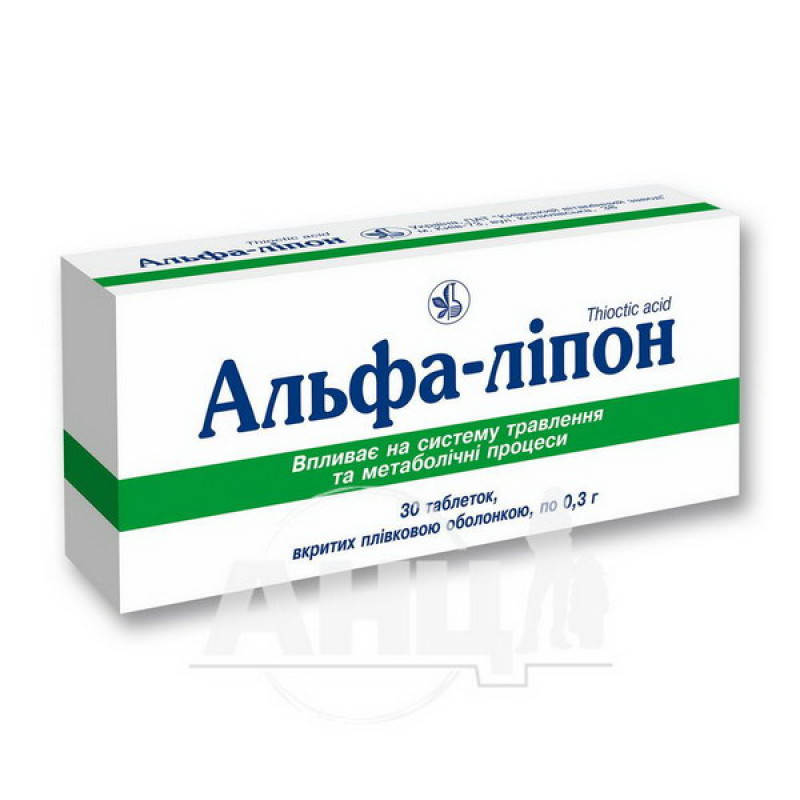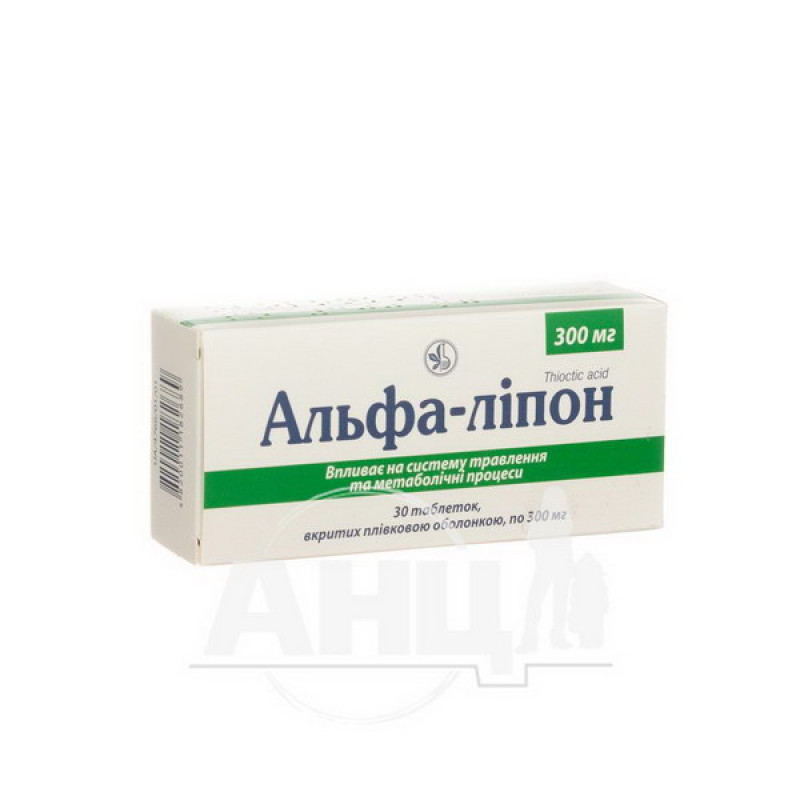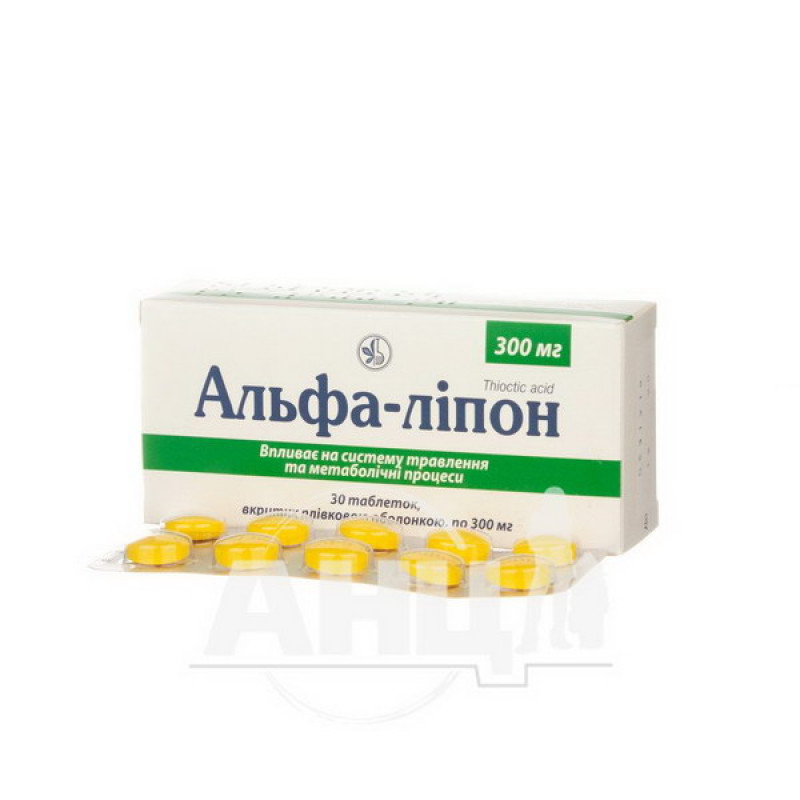Alpha-lipoic acid film-coated tablets 300 mg blister pack No. 30

Pharmacological properties
Pharmacodynamics. Thioctic acid is an endogenous vitamin-like substance that performs the function of a coenzyme and participates in the oxidative decarboxylation of α-keto acids. As a result of hyperglycemia occurring in diabetes mellitus, glucose is attached to the matrix proteins of blood vessels and the formation of so-called advanced glycolysis end products occurs. This process leads to a decrease in endoneural blood flow and endoneural hypoxia / ischemia, which, in turn, causes increased formation of oxygen-containing free radicals that damage peripheral nerves. A decrease in the level of antioxidants, such as glutathione, in peripheral nerves has also been noted.
Pharmacokinetics. After oral administration, thioctic acid is rapidly absorbed. As a result of significant presystemic metabolism, the absolute bioavailability of thioctic acid is about 20%. Due to rapid distribution in tissues, the half-life of thioctic acid in blood plasma is about 25 minutes. The relative bioavailability of thioctic acid with oral administration of solid dosage forms is more than 60% in proportion to the drinking solution. C max in blood plasma of about 4 μg / ml was achieved approximately 30 minutes after oral administration of 600 mg of thioctic acid. Only a small amount of the substance is determined in the urine in unchanged form. Biotransformation is carried out by oxidative reduction of the side chain (β-oxidation) and / or S-methylation of the corresponding thiols. Thioctic acid in vitro reacts with metal ion complexes, for example with cisplatin, and forms sparingly soluble complexes with sugar molecules.
Indication
Paresthesia in diabetic polyneuropathy.
Application
The daily dose is 600 mg of thioctic acid (2 tablets of 300 mg or 1 tablet of 600 mg), which should be taken as a single dose 30 minutes before the first meal. Simultaneous food intake complicates absorption, so it is especially important for patients with prolonged gastric emptying to take the drug before meals. Do not chew the tablets and drink them with a sufficient amount of liquid, for example, 1 glass of water.
In case of intense paresthesia, treatment can be started with parenteral administration of thioctic acid, using appropriate dosage forms.
Contraindication
Hypersensitivity to thioctic acid or any component of the drug.
Side effects
From the nervous system: change or disturbance of taste sensations.
Gastrointestinal: nausea, vomiting, abdominal pain and gastrointestinal pain, diarrhea.
Metabolic: decreased blood glucose levels. There have been reports of complaints suggestive of hypoglycemic states, namely dizziness, increased sweating, headache and visual disturbances.
On the part of the immune system: allergic reactions, including skin rashes, hives (urticaria), itching, difficulty breathing.
Other: eczema (frequency cannot be estimated from the available data).
Special instructions
At the beginning of treatment of polyneuropathy due to regeneration processes, a short-term increase in paresthesias with a feeling of "crawling ants" is possible. When using thioctic acid in patients with diabetes mellitus, frequent monitoring of blood glucose levels is necessary. In some cases, it is necessary to reduce the doses of antidiabetic drugs to prevent the development of hypoglycemia.
Regular consumption of alcoholic beverages is a significant risk factor for the development and progression of polyneuropathy and may interfere with treatment success, so alcohol consumption should be avoided during treatment and in the periods between courses of treatment.
The drug Alpha-Lipon contains lactose, so it should not be used in patients with rare hereditary diseases such as galactose intolerance, lactase deficiency or glucose-galactose malabsorption syndrome. The dye E110, which is part of the tablet shell, may cause allergic reactions.
Use during pregnancy and breastfeeding. The use of thioctic acid during pregnancy is not recommended due to the lack of relevant clinical data. There is no data on the penetration of thioctic acid into breast milk, therefore its use during breastfeeding is not recommended.
Children: Alpha-lipoic acid should not be administered to children as there is insufficient clinical experience in this age group.
Ability to influence the reaction rate when driving vehicles or working with other mechanisms. During treatment, caution should be exercised when driving vehicles, other mechanisms, or engaging in other potentially hazardous activities that require increased attention and speed of psychomotor reactions, due to the possibility of adverse reactions such as hypoglycemia (dizziness and visual impairment).
The effectiveness of cisplatin is reduced when used simultaneously with the drug alpha-lipoic acid. Thioctic acid is a metal complexing agent and therefore, according to the basic principles of pharmacotherapy, it should not be used simultaneously with metal compounds (for example, with food supplements containing iron or magnesium, with dairy products, since they contain calcium). If the total daily dose of the drug is taken 30 minutes before breakfast, then food supplements containing iron and magnesium should be taken in the middle of the day or in the evening. When using thioctic acid in patients with diabetes, the hypoglycemic effect of insulin and oral antidiabetic agents may be enhanced, therefore, especially at the initial stage of treatment, careful monitoring of blood glucose levels is recommended. To avoid symptoms of hypoglycemia, in some cases, a reduction in the dose of insulin or oral antidiabetic agents may be required.
Overdose
Symptoms: In case of overdose, nausea, vomiting and headache may occur. After accidental use or attempted suicide with oral administration of thioctic acid in doses of 10-40 g in combination with alcohol, significant intoxication was noted, in some cases with a fatal outcome.
At the initial stage, the clinical picture of intoxication may manifest itself in psychomotor agitation or clouding of consciousness. Later, generalized convulsions and lactic acidosis occur. In addition, hypoglycemia, shock, acute skeletal muscle necrosis, hemolysis, disseminated intravascular coagulation syndrome, bone marrow suppression and multiple organ failure have been described in intoxication with high doses of thioctic acid.
Treatment. Even if severe intoxication with Alpha-Lipon is suspected (e.g., use of more than 20 tablets of 300 mg for adults or a dose of more than 50 mg/kg of body weight in children), immediate hospitalization and measures for accidental poisoning (e.g., induction of vomiting, gastric lavage, use of activated charcoal) are recommended. Treatment of generalized convulsions, lactic acidosis, and other life-threatening consequences of intoxication should be symptomatic and should be carried out in accordance with the principles of modern intensive care. To date, the benefit of hemodialysis, hemoperfusion, or filtration methods with forced removal of thioctic acid has not been confirmed.
Storage conditions
In the original packaging at a temperature not exceeding 25 °C.
There are no reviews for this product.
There are no reviews for this product, be the first to leave your review.
No questions about this product, be the first and ask your question.













